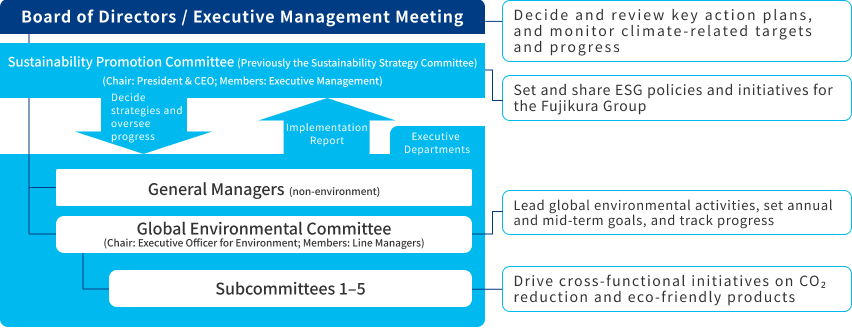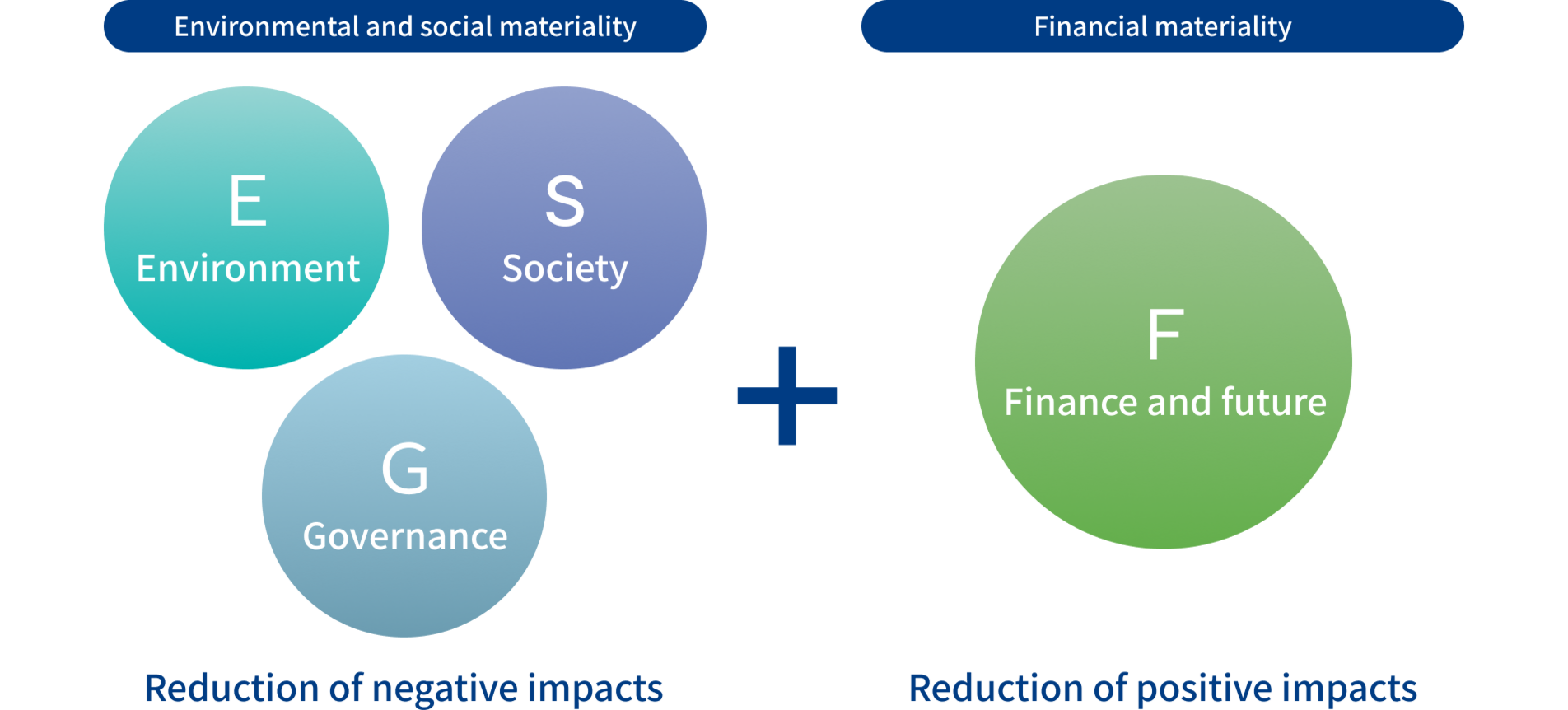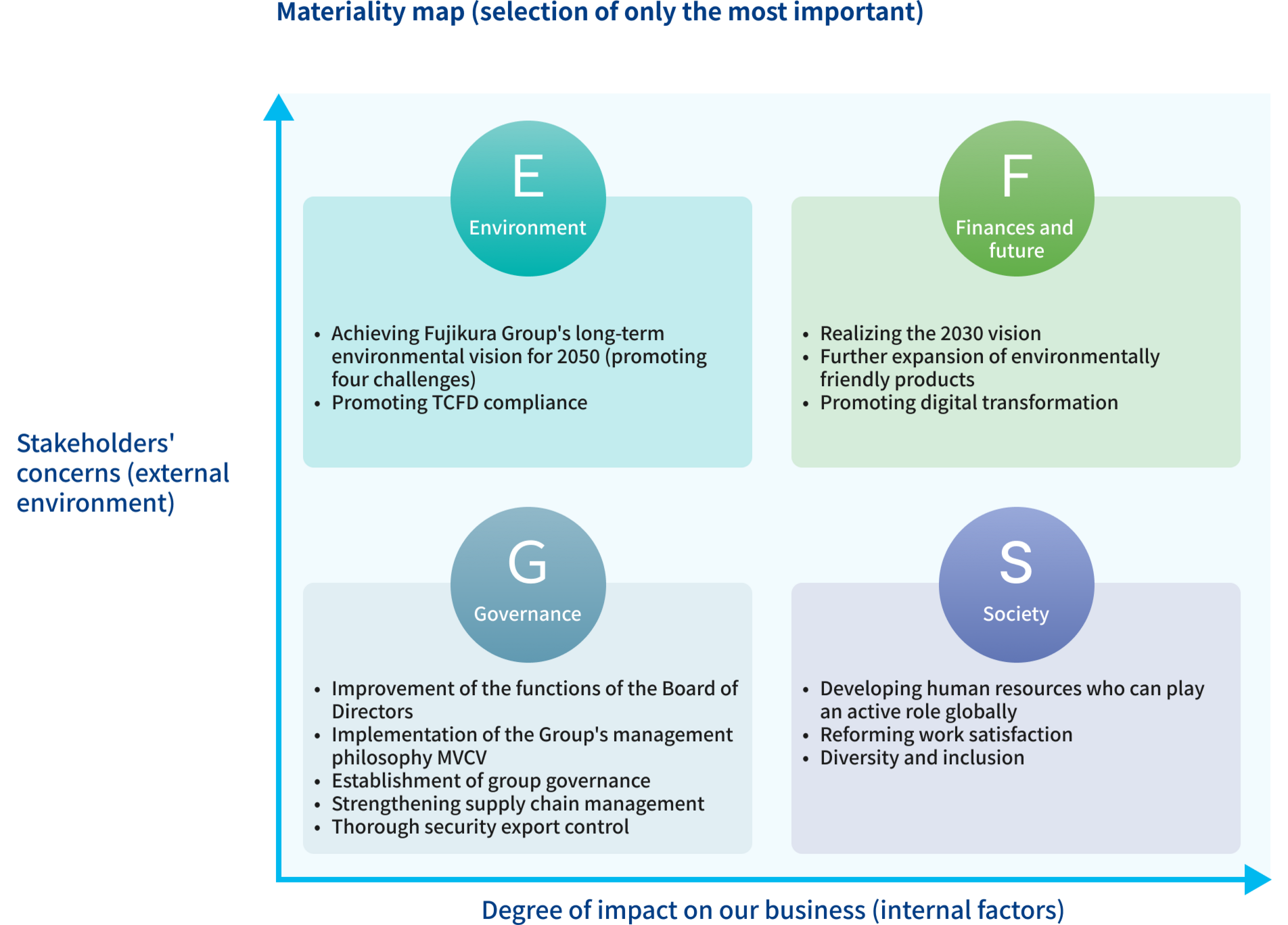Long-term Relationships of Trust
Respond to Societal Changes
Environment
community
Fujikura Group 's Corporate Philosophy MVCV states, "Fujikura Group creates value for customer and contributes to society through its "Tsunagu" Technology™," and bases its sustainability activities on ISO 26000, the international standard for social responsibility.
Fujikura Group 's CSR Philosophy, Basic Principle, and Activity guidelines
Fujikura Group CSR Philosophy
Fujikura Group believes that the corporate social responsibilities the Group should follow are comprised of activities required for sustainable corporate management and activities for the establishment of a sustainable society, based on Fujikura Group's Corporate Philosophy (MVCV).
Fujikura Group CSR Basic Principles
Fujikura Group aims to be a company that society expects to grow and develop, and to serve as a bridge to a prosperous future for people, society, and the global environment through its "Tsunagu" Technology™. To this end, we have defined four priority areas for fulfilling our social responsibilities in all aspects of our corporate activities, and we comply with the laws and regulations of each country and region, as well as international rules, and each Fujikura employee will be aware of their role as a member of society and act with social conscience.
[Four Focus Areas]
- Sincere corporate activities
- Concern for the environment
- Respect for people
- In harmony with society
Fujikura Group Activity Guideline
-
1. Sincere Corporate Activities
- (1) We conduct corporate activities sincerely, complying with all relevant laws and regulations in the various counties and regions we operate in good faith. We conduct ourselves with a sense of ethics and social decency, recognizing ourselves as members of society.
- (2) We work on maintaining and improving customer satisfaction by providing useful, safe and high-quality products and solutions from the viewpoint of customers.
- (3) We conduct fair and transparent transactions in free and open competition.
- (4) We maintain a healthy and normal relationship with politics, governments, citizens and various organizations.
- (5) We manage and protect thoroughly information related to the Fujikura Group and its customers.
-
2.Consideration of the Environment
- (6) We set voluntary management standards and work on maintaining and improving them, while complying with environmental regulations of the various countries and regions we operate in.
- (7) We promote reducing our environmental burden in all business activities ranging from developing, designing, procuring, manufacturing, constructing to selling, distributing and disposing products, aiming to develop a sustainable society in harmony with the global environment.
- (8) We promote environmentally friendly technological innovations and manufacture environmentally friendly products, while providing customers with information on appropriate ways of use, recycling and disposal of products.
- (9) We contribute to society widely, actively participating in environmental preservation activities in the various countries and regions we operate in.
- (10) We work on preserving the ecosystems, recognizing the importance of biodiversity in the global environment.
-
3.Respect for Human Beings
- (11) We secure the safety of all people involved in corporate activities of the Fujikura Group to maintain and improve the working environment.
- (12) We aim to create a comfortable workplace, where all employees can fully demonstrate their initiatives and creativity, without discrimination.
- (13) We work on providing employees with opportunities equally and do all we can to assist them in maintaining their work-life balance.
- (14) We respect the rights of all people and never allow human rights violation, including forced labor and child labor.
-
4.In Harmony with Society
- (15) We make social contribution actively, respecting the cultures and customs of the various countries and regions we operate in.
- (16) We work on maintaining and developing healthy relationship with all stakeholders by broadly communicating with them.
- (17) We disclose corporate information actively on a timely and appropriate basis.
Sustainability Management System
Since fiscal 2009, Fujikura Group has been promoting CSR under a management system centered around Fujikura Group CSR committee.
In recent years, as society has increasingly called for action on climate change, and ESG investment by institutional investors has become mainstream, it has become increasingly important for corporate activities to not only fulfill corporate social responsibility (CSR), but also to aim for sustainable growth (sustainability) based on ESG activities.
In order to incorporate this ESG perspective into our management plans and achieve increased corporate value and sustainable growth (sustainability), we have established a new Sustainability Promotion committee (hereinafter referred to as the "committee"), an extension of our previous CSR committee. We are promoting the development of sustainability governance in accordance with Internal rule. The committee reports, discusses, and shares information to formulate sustainability strategy that incorporate ESG perspectives as requested by stakeholder and monitor and supervise the execution of those strategies. committee is chaired by Director, President and CEO and is comprised of directors (excluding some directors and outside officers) and Corporate Officer.

Views on Sustainability Targets 2025
Based on the Group's Corporate Philosophy, MVCV, Fujikura Group believes that achieving sustainability requires both activities necessary for "sustainable corporate management" and activities that help build a "sustainable society."
Until now, we have established five-year CSR Priority Measures 2020 (fiscal 2015-2020) based on environmental and social materiality, and promoted each measure in cooperation with relevant unit. However, society has changed rapidly since the goals were set, making a fundamental review necessary. Therefore, for the new five-year Sustainability Goals 2025 (fiscal 2021-2025), starting in fiscal 2021, we have set goals that take into account environmental and social materiality while also taking into account financial materiality. In addition, by linking these with Fujikura Group 's long-term visions (Vision 2030 and Fujikura Group Long-Term Environmental Vision 2050), we have created goals that look more toward the future.
The Sustainability Goals 2025 were discussed and approval by the Sustainability Promotion committee (formerly the Sustainability strategy Council).
Sustainability Goal Setting Process

Introducing double materiality perspectives
In setting our Sustainability Goals for 2025, we reviewed the results of our CSR Priority Measures for 2020 and identified new perspectives that should be incorporated based on the latest trends. In identifying the latest trends, we referred to domestic and international social issues, international guideline, evaluation criteria from ESG rating agencies, and feedback from stakeholder.

Formulation of a materiality matrix
Based on the Fujikura Group CSR basic policy and the four priority issues, Fujikura Group created a materiality map to determine the themes for its Sustainability Goals 2025. This was done by conducting a materiality map analysis with stakeholder inclusion in mind, and was evaluated and verified from two perspectives: "stakeholder concerns" and "impact on Fujikura's business."
As a result, we have set three items for F (Finance/Future), five for E (Environment), three for S (Society), and five for G (governance), and we evaluate our targets and performance every year toward achieving our goals by fiscal 2025. We publish our progress toward our targets every year in our integrated report and on our ESG website.

Deliberations at the Sustainability Promotion committee (formerly the Sustainability strategy Council)
The Sustainability Goals 2025 added F (finance/future) to the ESG perspective, newly incorporating the impact of the environment and society on corporate performance, and taking into consideration the achievement of Fujikura's long-term vision, including the 2030 Vision.
Overview of Sustainability Targets 2025

List of Sustainability Targets 2025
| theme | Priority Measures | FY2025 and future goals | Main achievements for fiscal 2024 | ||
|---|---|---|---|---|---|
| F = Financial Future | "Tsunagu" Solution By providing Comfortable and sustainable "Future" society Resolve issues and Continuous Increase corporate value |
Explore new business in the four areas envisioned in the 2030 Vision | ① Evolution and development of core technologies in existing business |
|
|
| ②Exploring new technologies and business fields |
|
| |||
| To the global environment Considered Safe to use Product Development |
By 2050, replace all Fujikura products with environmentally friendly products (green products) |
| |||
| Expand green product creation activities to all group companies by 2030 |
| ||||
| Data and Digital technology Utilized Improving the efficiency of existing business and New Business Model Creation |
DX at manufacturing sites (smart factories, AI utilization) |
| |||
| [Challenge 1] Total CO₂ emissions from factories “2050 Zero Challenge" |
Reducing CO₂ emissions | Scope: SBT certified boundary |
|
| |
| Improving production efficiency (promoting energy conservation) | Scope: Fujikura Group (domestic and overseas) |
|
| ||
| Improving product Butsuryu efficiency | Scope: Fujikura Group (domestic) |
|
| ||
| [Challenge 2] Engineering Minimize water use on site and drainage pipes |
Contributing to reducing water risks |
|
| ||
| [Challenge 3] Engineering Coexistence of people and nature raw |
Make effective use of the natural environment within business premises and contribute to the expansion of biodiversity |
| |||
| Promoting local natural environment conservation activities | |||||
| [Challenge 4] Capital Effective use of resources and Source circulation |
Reduce resource input and promote efficient use of resources | Scope: Fujikura Group (domestic and overseas) |
|
||
| Reducing disposal generated from business activities | Scope: Fujikura Group (domestic) |
|
|
||
| Achievement of zero disposal emissions | Scope: Fujikura Group (domestic) |
| |||
| Climate Change Governance Construction of a system (TCFD correspondence) |
Understanding climate change risks and opportunities Understand strategy and financial impact |
|
|||
| S = society | Workplace satisfaction reform ( Strong engagement ) |
Each Fujikura employee grows as a person through self-actualization and is fulfilled both personally and professionally. |
|
| |
| Globally Can be active Human Resource Development |
All Fujikura Group Fujikura employee are active with a global perspective |
|
| ||
| Diversity & Inclusion (Consideration for Fujikura employee human rights) |
human resource with diverse backgrounds and ways of thinking are active | Goals (by fiscal 2025)
|
| ||
| G= governance | Improving the effectiveness of Board of Directors' Meeting |
|
| ||
| Group Corporate Philosophy MVCV in practice |
|
| |||
| Group governance Building a (risk management Strengthening) |
Establishing a risk management system that contributes to strategy management and risk control (PDCA) Strengthening investment management |
| |||
| supply chain Management (Responsibility) Responsible mineral sourcing nothing) |
Establishment of supply chain management that takes social issues (child labor, forced labor, etc.) into consideration Establish a system for responsible mineral procurement (due diligence system for cobalt, mica, etc., focusing on 3TG) Zero complaints from external parties such as NGOs (or prompt corrections when complaints are received) Collaboration with other companies (learning from other companies' efforts and applying them to Fujikura's own efforts) |
| |||
| security export control Thorough |
Enhanced Export Control compliance Compliance |
|
| ||

